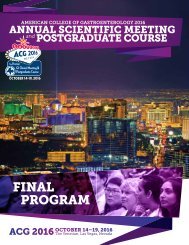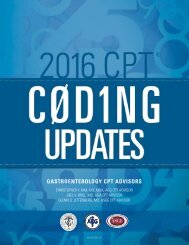ACG's 2014 Postgraduate Course – Saturday, October 18Annual Postgraduate CourseSaturday and Sunday, October 18 and 19, 2014 • Terrace BallroomCourse Co-Directors: Lauren B. Gerson, MD, MSc, FACG, and Seth A. Gross, MD, FACGSaturday, October 18, 20147:50 am – 5:00 pm7:50 am Introduction by Course DirectorsLauren B. Gerson, MD, MSc, FACGSeth A. Gross, MD, FACGsession 1A: Esophagusmoderator: Lauren B. Gerson, MD, MSc, FACG8:00 am A 360-Degree Approach to GERDLauren B. Gerson, MD, MSc, FACGDiscuss GERD management based on recent ACG guidelines.8:20 am Achalasia: Opening Up the Bird’s BeakPhilip O. Katz, MD, FACGDiscuss diagnosis and management of achalasia based onrecent ACG guidelines.8:40 am EoE and EosinophiliaNirmala Gonsalves, MDDiscuss diagnosis and management of EoE based on recentACG guidelines.9:00 am Barrett’s Esophagus: Detection, Surveillance, TreatmentNicholas J. Shaheen, MD, MPH, FACGOutline recommendations for management of BE based oncurrent ACG guidelines.9:20 am Panel Q & A9:40 am Break10:00 am The David Sun LectureThe Cloudy Future for Physicians: Reimbursement andPractice Changes in the Post-ACA EraThomas A. Scully, JDExplain the impact of health reform on clinical GI practice.session 1B: Colonmoderator: Seth A. Gross, MD, FACG10:30 am How to Improve the Quality of Your ColonoscopyDouglas K. Rex, MD, MACGDescribe the importance of bowel preparation and howinspection techniques improve adenoma detection.10:50 am Removal of Flat and Large PolypsMichael Wallace, MD, MPH, FACGDetermine the best approach to identify and remove thesechallenging lesions.11:10 am Colon Cancer Screening: Should It Differ by Ethnicity,Gender, and Age?Aasma Shaukat, MD, MPH, FACGAnalyze recent data demonstrating differences in colonneoplasia by ethnicity and gender.For more information on ACG 2014 and to register, visit www.acgmeetings.gi.org.1811:30 am Advanced Imaging for Colon Cancer Screening – Is There aRole?Seth A. Gross, MD, FACGEvaluate recent advances in colonoscopy imaging and the potentialrole in clinical practice.11:50 am Panel Q & A12:10 pm Break for Learning LuncheonsSaturday Learning Luncheons12:20 pm – 1:35 pmCost is $75 per person/per lunch. See page 124 for more information.1. Food Allergies and the GI Tract: Fact or Fiction?Sheila E. Crowe, MD, FACGInterpret the role of food allergies in patients presenting withgastrointestinal disorders.2. Refractory GERD: The Esophageal Physiology ToolboxMarcelo F. Vela, MD, MSCR, FACGDetermine an approach to managing the patient presenting withGERD symptoms refractory to PPI therapy.3. Don’t Panic: It’s a Visible Vessel!Loren A. Laine, MD, FACGEvaluate the management of peptic ulcers with high risk stigmata anddiscuss recent ACG guidelines on UGIB.4. Fecal Transplantation for Clostridium difficile InfectionLawrence J. Brandt, MD, MACGEvaluate the current state-of-the-art treatment using fecaltransplantation for patients with Clostridium difficile infection.5. Diverticular Disease: Dispelling the MythsLisa L. Strate, MD, MPH, FACGAnalyze new concepts regarding the management of complicateddiverticular disease including diverticulitis and diverticularhemorrhage.6. Miscellaneous ColitidesDarrell S. Pardi, MD, FACGCompare and contrast management options of microscopic,ischemic, eosinophilic and drug-induced colitis.7. Anorectal Disorders UpdateAmy E. Foxx-Orenstein, DO, FACGAssess recent ACG guidelines regarding diagnosis and managementof anorectal disorders including pelvic floor dysfunction, fecalincontinence, and anal fissures.8. The Role of Complementary Therapy in Your PracticeDavid J. Hass, MD, FACGSpecify potential usage of herbal therapy, biofeedback, hypnosis, andother alternative therapeutic options for gastroenterologists.9. Update in NASHZobair M. Younossi, MD, MPH, FACGIdentify recent advances in diagnosis and management of nonalcoholicsteatosis.10. You’ve Just Been Appointed to Run Your Endoscopy Unit: NowWhat?David H. Robbins, MD, MSc, FACGImplement management strategies to run an efficient endoscopy unit.
ACG's 2014 Postgraduate Course – Saturday, October 1811. The Post-ablation Esophagus: What Lies BeneathPrateek Sharma, MD, FACGAssess the possibility of persistent intestinal metaplasia after RFAand utilize tools for diagnosis, including confocal microscopy and/or OCT.12. Obscure GI Bleeding – What’s the Current Algorithm?Lauren B. Gerson, MD, MSc, FACGEvaluate the patient with obscure GI bleeding and utilize toolsincluding capsule endoscopy and deep enteroscopy.session 1C: Biliary Diseasemoderator: Gregory G. Ginsberg, MD, FACG1:45 pm Choledocholithiasis: Management Strategies?Gregory G. Ginsberg, MD, FACGEvaluate the different presentations of choledocholithiasis tohelp better triage your patient.2:05 pm Choledochal Cysts: Recognition and ManagementLaith Jamil, MDIdentify the various types of choledochal cysts and their clinicalimpact.2:25 pm Minimizing Adverse Events During ERCPChristopher J. DiMaio, MD, FACGIdentify potential adverse events associated with ERCP andsolutions to their management.2:45 pm Management of Indeterminate Biliary StricturesSteven A. Edmundowicz, MDEvaluate and manage indeterminate biliary strictures.3:05 pm Panel Q & A3:25 pm BreakNEW THIS YEAR:PG+MOCMaintenance of Certification available inconjunction with ACG’s Postgraduate CoursePG Course attendees can purchase and complete the PG+MOConline module and earn 10 MOC points. Here is how it works:1) Purchase the PG+MOC online module when you register for theACG 2014 Postgraduate Course. (Use the Registration Form onpage 125; pre-registration deadline is September 24, 2014.)2) Prior to the meeting, you’ll receive an email when thePG+MOC module is available in early October.3) Log in and answer the module’s 30 questions. Upon completion,you’ll receive a customized curriculum of recommended sessionsspecifically designed for you to attend at the PG Course. Thecustomized curriculum, based on your results from taking themodule, will help to fill any knowledge gaps. If you completethe module with a passing score, you can submit directly toABIM to earn your MOC points immediately. Then use yourcustomized curriculum to attend the PG Course.4) After the course, log in to the PG+MOC module again, re-takeONLY the questions you answered incorrectly prior to the course,and, upon achieving a passing score, submit your results toABIM to earn your MOC points. You have three attempts toachieve a passing score.You must be registered for the ACG 2014 Postgraduate Courseto take advantage of this special offer. ACG members maypurchase the PG+MOC online module for an additional $40;non-members may purchase it for an additional $50. If youare already registered for the PG Course: purchase this specialmodule at http://acgmeetings.gi.org/pgmoc.asp.Simultaneous Symposia Sessions3:45 pm – 5:00 pmsymposium A: Endoscopymoderator: Douglas G. Adler, MD, FACG3:45 pm When, Where, and Why to Place a Luminal StentDouglas G. Adler, MD, FACGEvaluate indications for stent placement in the gastrointestinaltract.4:05 pm EMR, ESD or Old-fashioned Polypectomy?Michael B. Wallace, MD, MPH, FACGDifferentiate between options for polyp removal in the upperand lower GI tracts including when to perform EMR and/orESD.4:25 pm Adverse Events During or After Colonoscopy: How to AvoidNeeding Surgical HelpGottumukkala S. Raju, MD, FACGFormulate potential management strategies for adverse eventsassociated with colonoscopies, including perforation andbleeding.4:45 pm Panel Q & Asymposium B: GI Bleeding: What's Newmoderator: John R. Saltzman, MD, FACG3:45 pm How to Manage Non-Variceal Bleeding: What’s New?John R. Saltzman, MD, FACGAnalyze new methods for cessation of non-variceal bleeding,including non-endoscopic options.4:05 pm Hemorrhoidal or Not Hemorrhoidal: That Is the QuestionLisa L. Strate, MD, MPH, FACGDiscuss recent ACG guidelines for LGIB and determineappropriate management.4:25 pm Should I Alter My Patient’s Antiplatelet Therapy? Howto Manage Medications Before Routine Endoscopy andWhen the Patient Is BleedingNeena S. Abraham, MD, MSCE, FACGDetermine management strategies for patients who are usingaspirin, NSAIDs, clopidogrel, or other antiplatelet agents.4:45 pm Panel Q & Asymposium C: How to Handle GI Emergenciesmoderator: David A. Greenwald, MD, FACG3:45 pm Foreign Bodies: How to Get Them OutDavid A. Greenwald, MD, FACGDefine management options for foreign bodies in the GI tract.4:05 pm Variceal Bleeding: Treatment StrategiesGuadalupe Garcia-Tsao, MDIdentify treatment strategies for acute variceal hemorrhage.4:25 pm How to Handle the 2:00 am Call About a Dilated ColonEamonn M. M. Quigley, MD, FACGIdentify management strategies for patients presenting withOgilvie’s syndrome and other causes of megacolon.4:45 pm Panel Q & APOSTGRADUATECOURSE19For more information on ACG 2014 and to register, visit www.acgmeetings.gi.org.
- Page 6 and 7: Featured LecturesDavid Sun LectureT
- Page 8: Special EventsThere are numerous op
- Page 12 and 13: ACG's 2014 Optional Friday Coursesa
- Page 15 and 16: asge-sponsored endoscopy courseACG'
- Page 18: Optional Friday Courses / ACG's 201
- Page 23 and 24: ACG's 2014 Postgraduate Course - Su
- Page 25 and 26: ACG's 2014 Annual Scientific Meetin
- Page 27 and 28: Annual Scientific Meeting Agenda -
- Page 29 and 30: Annual Scientific Meeting Agenda -
- Page 31 and 32: Annual Scientific Meeting Agenda -
- Page 33 and 34: Annual Scientific Meeting Agenda -
- Page 35 and 36: Annual Scientific Meeting Agenda -
- Page 37 and 38: Annual Scientific Meeting Agenda -
- Page 39 and 40: Annual Scientific Meeting - Faculty
- Page 41 and 42: Poster PresentationsSunday, October
- Page 43 and 44: Poster Presentations - Sunday, Octo
- Page 45 and 46: Poster Presentations - Sunday, Octo
- Page 47 and 48: Poster Presentations - Sunday, Octo
- Page 49 and 50: Poster Presentations - Sunday, Octo
- Page 51 and 52: Poster Presentations - Sunday, Octo
- Page 53 and 54: Poster Presentations - Sunday, Octo
- Page 55 and 56: Poster Presentations - Sunday, Octo
- Page 57 and 58: Poster Presentations - Sunday, Octo
- Page 59 and 60: Poster Presentations - Sunday, Octo
- Page 61 and 62: Poster Presentations - Sunday, Octo
- Page 63 and 64: Poster Presentations - Sunday, Octo
- Page 65 and 66: Poster Presentations - Sunday, Octo
- Page 67 and 68: Poster Presentations - Sunday, Octo
- Page 69 and 70:
Poster Presentations - Monday, Octo
- Page 71 and 72:
Poster Presentations - Monday, Octo
- Page 73 and 74:
Poster Presentations - Monday, Octo
- Page 75 and 76:
Poster Presentations - Monday, Octo
- Page 77 and 78:
Poster Presentations - Monday, Octo
- Page 79 and 80:
Poster Presentations - Monday, Octo
- Page 81 and 82:
Poster Presentations - Monday, Octo
- Page 83 and 84:
Poster Presentations - Monday, Octo
- Page 85 and 86:
Poster Presentations - Monday, Octo
- Page 87 and 88:
Poster Presentations - Monday, Octo
- Page 89 and 90:
Poster Presentations - Monday, Octo
- Page 91 and 92:
Poster Presentations - Monday, Octo
- Page 93 and 94:
Poster Presentations - Monday, Octo
- Page 95 and 96:
Poster Presentations - Tuesday, Oct
- Page 97 and 98:
Poster Presentations - Tuesday, Oct
- Page 99 and 100:
Poster Presentations - Tuesday, Oct
- Page 101 and 102:
Poster Presentations - Tuesday, Oct
- Page 103 and 104:
Poster Presentations - Tuesday, Oct
- Page 105 and 106:
Poster Presentations - Tuesday, Oct
- Page 107 and 108:
Poster Presentations - Tuesday, Oct
- Page 109 and 110:
Poster Presentations - Tuesday, Oct
- Page 111 and 112:
Poster Presentations - Tuesday, Oct
- Page 113 and 114:
Poster Presentations - Tuesday, Oct
- Page 115 and 116:
Poster Presentations - Tuesday, Oct
- Page 117 and 118:
Poster Presentations - Tuesday, Oct
- Page 119 and 120:
Poster Presentations - Tuesday, Oct
- Page 121 and 122:
Poster Presentations - Tuesday, Oct
- Page 123 and 124:
General InformationAccreditationThe
- Page 125 and 126:
ACG Auxiliary Events and ToursAuxil
- Page 127 and 128:
ACG 2014 Registration FormMail to:
- Page 129 and 130:
Exhibit HallThe science and technol
- Page 131 and 132:
Child Care Registration FormThe Ame
- Page 133:
For ACG 2014 Annual Postgraduate Co




